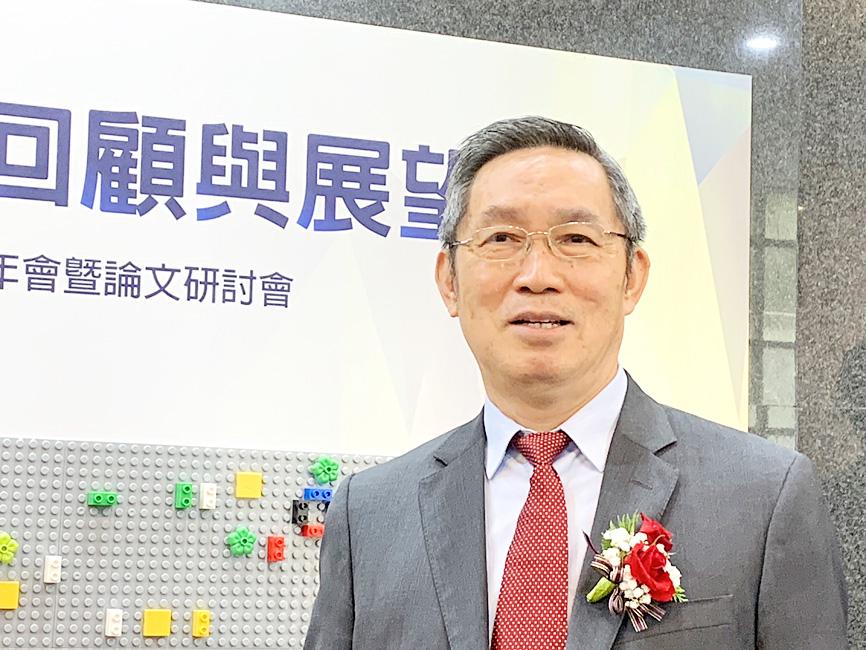Vanguard International Semiconductor Corp (世界先進), a supplier of display driver ICs and power management chips, yesterday predicted that revenue this quarter would expand more than 13 percent sequentially to a new record, mainly due to price hikes amid a persistent imbalance between supply and demand.
Near-term demand is “very strong,” while its longer-term business outlook is underpinned by a structural change in matured 8-inch technology nodes amid scarce supply, as well as the rapid increase in demand that is expected for 5G devices and electric vehicles in next few years, the Hsinchu-based chipmaker said.
“Generally speaking, demand for Vanguard’s foundry services will increase at a constant rate this quarter, greatly enhancing order visibility,” Vanguard chairman Fang Leuh (方略) told investors in an online conference. “We expect factory utilization to remain high for the whole of 2021.”

Photo: Grace Hung, Taipei Times
Demand for driver ICs used for smartphone displays and in other devices shows the greatest growth momentum, which will lead to an increase in 0.18 micron technology and advanced technologies revenue contribution this quarter, Fang said.
Revenue from 0.18 micron and more-advanced technology made up 52 percent of Vanguard’s revenue last quarter following five consecutive quarters of increases, the company said.
Vanguard plans to hike prices by a low-teen percentage this quarter from last quarter, given the favorable supply-demand environment and increases in manufacturing costs, it said.
Shipments are to increase at a quarterly pace of 3 percent this quarter, it said.
To alleviate a supply crunch, Vanguard said it plans this quarter to add about 8,000 wafers a month of capacity at its Taoyuan fab.
The added capacity — which would be for customers who have inked long-term supply agreements — would help Vanguard cope with supply constraints and the rising cost of building new capacity, it said.
The remaining capacity — about 16,000 wafers per month — will be available from the middle of next year, it said.
Gross margin is expected to improve to between 44 and 46 percent this quarter, after reaching a 14-year high of 40.9 percent last quarter, Vanguard said.
The chipmaker attributed the gross margin improvement to price rises, an improved product portfolio and technology upgrades.
The firm does not expect substantial changes in competition from Chinese rivals, Fang said.
There is no imminent risk of order loss to chipmakers operating 12-inch fabs, as cost and production efficiency hurdles are high, he said.
Vanguard operates four fabs, all of which produce 8-inch wafers.
Net profit surged 75.6 percent to NT$2.6 billion (US$93.09 million) in the quarter ended June 30, compared with NT$1.81 billion in the second quarter of last year.
That was a quarterly increase of 17.5 percent from NT$2.21 billion.
That translated into earnings per share of NT$1.58 last quarter, up from NT$0.9 in the second quarter of last year and NT$1.34 in the January-to-March quarter.
Vanguard kept capital expenditure for this year unchanged at NT$8.5 billion.

TAKING STOCK: A Taiwanese cookware firm in Vietnam urged customers to assess inventory or place orders early so shipments can reach the US while tariffs are paused Taiwanese businesses in Vietnam are exploring alternatives after the White House imposed a 46 percent import duty on Vietnamese goods, following US President Donald Trump’s announcement of “reciprocal” tariffs on the US’ trading partners. Lo Shih-liang (羅世良), chairman of Brico Industry Co (裕茂工業), a Taiwanese company that manufactures cast iron cookware and stove components in Vietnam, said that more than 40 percent of his business was tied to the US market, describing the constant US policy shifts as an emotional roller coaster. “I work during the day and stay up all night watching the news. I’ve been following US news until 3am

UNCERTAINTY: Innolux activated a stringent supply chain management mechanism, as it did during the COVID-19 pandemic, to ensure optimal inventory levels for customers Flat-panel display makers AUO Corp (友達) and Innolux Corp (群創) yesterday said that about 12 to 20 percent of their display business is at risk of potential US tariffs and that they would relocate production or shipment destinations to mitigate the levies’ effects. US tariffs would have a direct impact of US$200 million on AUO’s revenue, company chairman Paul Peng (彭雙浪) told reporters on the sidelines of the Touch Taiwan trade show in Taipei yesterday. That would make up about 12 percent of the company’s overall revenue. To cope with the tariff uncertainty, AUO plans to allocate its production to manufacturing facilities in

Six years ago, LVMH’s billionaire CEO Bernard Arnault and US President Donald Trump cut the blue ribbon on a factory in rural Texas that would make designer handbags for Louis Vuitton, one of the world’s best-known luxury brands. However, since the high-profile opening, the factory has faced a host of problems limiting production, 11 former Louis Vuitton employees said. The site has consistently ranked among the worst-performing for Louis Vuitton globally, “significantly” underperforming other facilities, said three former Louis Vuitton workers and a senior industry source, who cited internal rankings shared with staff. The plant’s problems — which have not

COLLABORATION: Given Taiwan’s key position in global supply chains, the US firm is discussing strategies with local partners and clients to deal with global uncertainties Advanced Micro Devices Inc (AMD) yesterday said it is meeting with local ecosystem partners, including Taiwan Semiconductor Manufacturing Co (TSMC, 台積電), to discuss strategies, including long-term manufacturing, to navigate uncertainties such as US tariffs, as Taiwan occupies an important position in global supply chains. AMD chief executive officer Lisa Su (蘇姿丰) told reporters that Taiwan is an important part of the chip designer’s ecosystem and she is discussing with partners and customers in Taiwan to forge strong collaborations on different areas during this critical period. AMD has just become the first artificial-intelligence (AI) server chip customer of TSMC to utilize its advanced